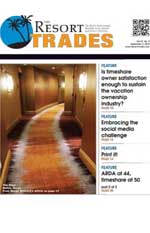Is Timeshare Owner Satisfaction Enough to Sustain the Vacation Ownership Industry?
Thursday, September 5, 2013

Thank you to The Resort Trades for publishing this article that looks at vacation ownership industry issues of consumer trust–issues that seem to never really go away in our business. As much as it seems to be stating the obvious, the timeshare industry cannot rely on their primary buyer of new timeshares, being the current timeshare owner.
The article is printed in entirety on the website for The Resort Trades and appears in print in the August edition of the publication. To view the original article: CLICK HERE.
Is timeshare owner satisfaction enough to sustain the vacation ownership industry?
by Jason Tremblay
When ARDA President Howard Nusbaum reports an 83 percent satisfaction rate by current timeshare owners with the vacation ownership product, we, as an industry, breathe a sigh of relief.
We are not the evil villains our critics make us out to be, pedaling a product that consumers are duped into buying and immediately regret.
No, we are okay; the 2012 edition of the “Shared Vacation Ownership Owners Report” assures us we are. And in a Sally Field moment, we reaffirm to ourselves, our staffs, our peers and the media that timeshare owners like us, they really like us.
But do they? Or do they like the timeshares themselves and just tolerate all of us who build, manage, sell, resell, and market the beautiful, spacious resort properties?
This is the age of relationship building. Whether you are growing a business, leading an organization, or running for political office, your success or failure typically is directly proportional to your skill at building relationships.
But as author Rohit Bhargava explains in his best-selling book, “Likeonomics,” we are living in “the society of distrust,” where the trust gap between people and the organizations with which they interact is ever widening.
According to Bhargava, research from the 12th Annual Edelman Trust Barometer Study showed that the United States was the only country studied where distrust in all institutions (business, government, media, and NGOs) increased, across the board.
Recognizing that relationship-building is the key component to business success and that we live in a social climate where distrust spreads like a devious virus, how does any industry flourish?
More importantly, how can the timeshare industry, with its long history of being misunderstood and too-often maligned, find a way to prosper? Perhaps it is time we did a better job of putting a face on our brands.
If you ask the average consumer to identify people who work in the timeshare industry, some would point to Diamond Resort International’s CEO Stephen J. Cloobeck, who gained a level of notoriety for his two appearances on the CBS reality show “Undercover Boss.”
A few others might recognize Westgate Resorts founder and CEO, David Siegel. Siegel, along with his wife Jackie, was the subject of an independent film called “The Queen of Versailles,” which chronicled their lives and their ongoing project to build a 90,000-square-foot home modeled after the famous French Palace of Versailles.
Interesting personalities and glamorous lifestyles in both cases, but neither of these top executives represent the face and lifestyle of vacation ownership’s rank and file. The men and women who handle reservations, greet guests upon arrival, and plan resort activities are timeshare’s real countenance.
So are the people who work in the timeshare industry at data entry, maintenance, accounting, marketing, and hundreds of other positions where owners never see the faces of these hardworking team members, yet whose ownership experiences wouldn’t be the same without them.
Like attracts like; it’s one of the first principles of sales that most of us learn. Your prospects are more likely to become your clients and customers when they identify with you.
This concept of commonality and connection is also the reason people connect with total strangers via social media – we like finding other people who have interests, backgrounds, experiences or even dislikes that are in harmony with our own.
When a company puts forward the real faces and real stories of its team members, it stops being a cold, impersonal corporation and becomes humanized.
Real people, who make others think of their sons and daughters, their parents, or even themselves, are far less likely to be attacked by clients, critics or the media and the marketplace in general. And they are far more likely to be able to deliver the most important part of relationship building, the two-way conversation.
Since the days when vendors crossed the country in wagons, peddling their wares, barking their message to their audience, and on to the time of radio, television and even Internet advertising, it has been too easy for communication between sellers and their customers to be a one-way street.
Historically, consumers have been told about a product or service. They have been told how owning the product would make them feel. And they have been told why they should lay down their money and make the decision to buy.
But have we as companies and corporations been good listeners, or have we done too much of the talking?
Using every platform that traditional marketing avails, fortified by social media and all the strategies that have come to be known as “new media,” the brands and companies of vacation ownership have to figure out how to be perceived as the warm, energized and caring personalities of the workers who make timeshare hum.
We must create opportunities for two-way conversations, and then we must be better at listening than we are at talking (i.e., selling, marketing and messaging).
We must interact and engage with our clients and prospective clients through ways that are authentic, and that start at the front lines of our team and work their way up, rather than being top-down driven.
Who among us is surprised that 83 percent of timeshare owners are satisfied with timeshare when you acknowledge that timeshares are beautiful resorts, rich in amenities, and purpose-built for fun, relaxation and recreation?
Of course, timeshare owners like timeshares; yet the question remains of whether or not they like us, the companies behind the timeshares.
The legendary advertising guru David Ogilvy spelled it out clearly when he said, “The more people trust you, the more they buy from you.”
Much about the traditional model of selling timeshare has been grossly inadequate when it comes to connecting with new buyers and fostering their trust. Though the timeshare sales model has worked in the past, at least to a degree that was acceptable to many in the vacation ownership industry, it is clearly not working today.
We know this because even as the branded hospitality providers – the cornerstones of the industry – announce their profitability in quarterly and annual reports, they cannot hide the fact that their success is based on tightening their margins, increasing rentals, and selling more timeshare weeks or points to existing owners.
Perilous and delirious describes the actions of any industry that believes its future is sustainable when the highest percentage of its client base is its existing customers.
As buying preferences and behaviors continue to change with each generation, failing to change with them is self-destructive, arrogant, and in many ways, dismissive of the potential market with which an industry needs most to be building a relationship.
The formula in today’s complex marketplace, where distrust comes naturally and trust is hard-earned, is to reveal the authentic personality of your brand through the people that make that brand run on a daily basis. We must all stop selling, start listening, and build trust, allowing the true personalities of our brands to shine through.


